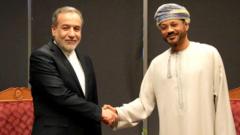Iran and the United States officially launched nuclear discussions in Muscat, Oman, signaling a potential thaw in relations following years of tension. Iranian Foreign Minister Abbas Araghchi emphasized the need for a "fair agreement," while the US seeks to prevent Iran from obtaining nuclear weapons. Since the US withdrawal from the 2015 nuclear deal in 2018, focuses have shifted to establishing a new negotiation framework amidst threats of military action and ongoing sanctions.
US-Iran Nuclear Negotiations Commence in Muscat

US-Iran Nuclear Negotiations Commence in Muscat
Historic discussions aimed at redefining nuclear agreements between the US and Iran begin in Oman, highlighting new diplomatic efforts.
Araghchi opened the talks by expressing a desire for an equitable solution, noting that the Iranian delegation comprised skilled negotiators familiar with the complexities of the nuclear issue. President Trump, meanwhile, indicated the meetings were critical but raised concerns about Iran's nuclear ambitions. He communicated that failure in negotiations could lead to severe repercussions, as both sides maneuver to secure their interests amid historical grievances and past agreements that shaped their current standpoints.
The upcoming talks follow Iran's continued grievances over US sanctions and its enriched uranium stockpile exceeding limitations set in 2015. Iran maintains its nuclear program is strictly for peaceful purposes. The outcomes of these negotiations could significantly influence regional stability and global security considerations, given the ongoing debates surrounding nuclear proliferation.
The upcoming talks follow Iran's continued grievances over US sanctions and its enriched uranium stockpile exceeding limitations set in 2015. Iran maintains its nuclear program is strictly for peaceful purposes. The outcomes of these negotiations could significantly influence regional stability and global security considerations, given the ongoing debates surrounding nuclear proliferation.




















